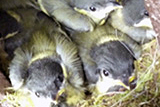Juliette Bailly PhD thesis
 Urbanization of natural populations: immunoecological and ecotoxicological consequences in birds
Urbanization of natural populations: immunoecological and ecotoxicological consequences in birds
Defended on the 23rd June 2015
Funding: ‘BQR université de Bourgogne – Région’
Supervisors: Bruno Faivre (laboratoire Biogéosciences) & Renaud Scheffler (laboratoire Chrono environnement, Besançon)
Started in October 2011
Abstract
Today, more than 50 % of world population is living in urban areas, against 30 % in 1950. Urbanization is a growing phenomenon linked with a complete artificialization of natural areas, and is a major component of global change. Several wild species have colonized cities that are characterized by biotic and abiotic conditions relatively different from those of natural areas. Investigate the response of wild organisms submitted to urban-specific selection pressure is therefore relevant in ecology and in evolutionary ecology. Mainly studies on bird species have already described differences between urban and natural areas at the community, population and individual levels. More precisely, urban environments were suggested to exert strong constrains on bird demography, as breeding success was significantly reduced in cities. Moreover, others life history traits like immunity, essential to cope with pathogens, should be altered in urban areas. Environmental factors such as low natural resources availability in cities and higher pollution were frequently cited in the literature to explain reduced breeding success in urban populations. Those elements could also altered immune defenses. In addition, urban individuals seem released from blood and ecto-parasites pressure. Urban and forest population of blue and great tits (Cyanistes caeruleus and Parus major) have been followed since 3 consecutive years in two regions of the East of France (Burgundy and Franche-Comté). Our results were in the sense of those already mentioned in the literature. Offspring survival and growth were significantly reduced in urban populations. In addition, experimental activation of inflammation showed a reduction of immunity in young urban great tits. Experimental (brood size manipulation) and descriptive (plasmatic concentrations of trace elements) analyses in this same species seemed to support the hypothesis of a potential lack of good quality resources in cities, that should alter nestling’s condition. However, further works are needed to identify functional mechanisms that explain differences between urban and non-urban populations. Several questions and prospects remain around urbanization to investigate evolutionary consequences on wild organisms.
Keywords
urbanization, reproduction, immunity, resources, pollution, tits
- extrait:
- lien_externe:
- kc_data:
- a:8:{i:0;s:0:"";s:4:"mode";s:0:"";s:3:"css";s:0:"";s:9:"max_width";s:0:"";s:7:"classes";s:0:"";s:9:"thumbnail";s:0:"";s:9:"collapsed";s:0:"";s:9:"optimized";s:0:"";}
- kc_raw_content:
 Urbanization of natural populations: immunoecological and ecotoxicological consequences in birds
Urbanization of natural populations: immunoecological and ecotoxicological consequences in birdsDefended on the 23rd June 2015
Funding: 'BQR université de Bourgogne – Région'
Supervisors: Bruno Faivre (laboratoire Biogéosciences) & Renaud Scheffler (laboratoire Chrono environnement, Besançon)
Started in October 2011
Abstract
Today, more than 50 % of world population is living in urban areas, against 30 % in 1950. Urbanization is a growing phenomenon linked with a complete artificialization of natural areas, and is a major component of global change. Several wild species have colonized cities that are characterized by biotic and abiotic conditions relatively different from those of natural areas. Investigate the response of wild organisms submitted to urban-specific selection pressure is therefore relevant in ecology and in evolutionary ecology. Mainly studies on bird species have already described differences between urban and natural areas at the community, population and individual levels. More precisely, urban environments were suggested to exert strong constrains on bird demography, as breeding success was significantly reduced in cities. Moreover, others life history traits like immunity, essential to cope with pathogens, should be altered in urban areas. Environmental factors such as low natural resources availability in cities and higher pollution were frequently cited in the literature to explain reduced breeding success in urban populations. Those elements could also altered immune defenses. In addition, urban individuals seem released from blood and ecto-parasites pressure. Urban and forest population of blue and great tits (Cyanistes caeruleus and Parus major) have been followed since 3 consecutive years in two regions of the East of France (Burgundy and Franche-Comté). Our results were in the sense of those already mentioned in the literature. Offspring survival and growth were significantly reduced in urban populations. In addition, experimental activation of inflammation showed a reduction of immunity in young urban great tits. Experimental (brood size manipulation) and descriptive (plasmatic concentrations of trace elements) analyses in this same species seemed to support the hypothesis of a potential lack of good quality resources in cities, that should alter nestling’s condition. However, further works are needed to identify functional mechanisms that explain differences between urban and non-urban populations. Several questions and prospects remain around urbanization to investigate evolutionary consequences on wild organisms.
Keywords
urbanization, reproduction, immunity, resources, pollution, tits
